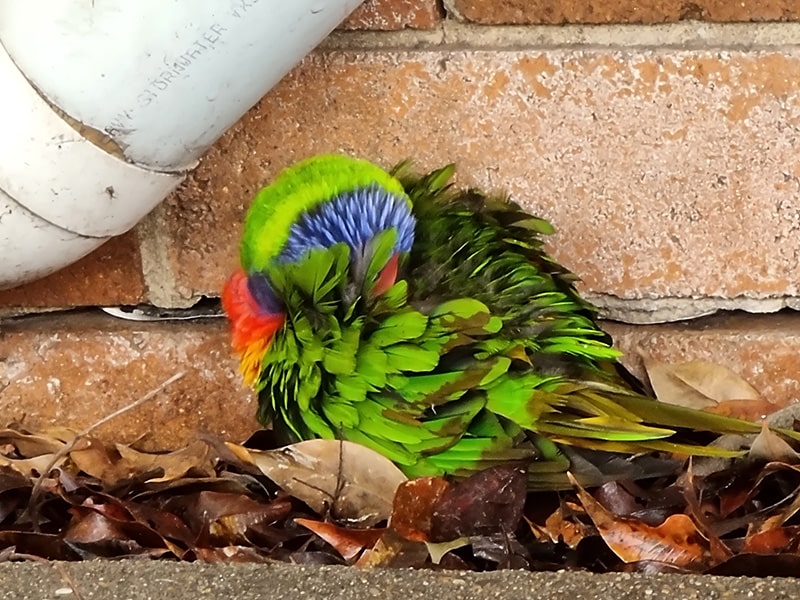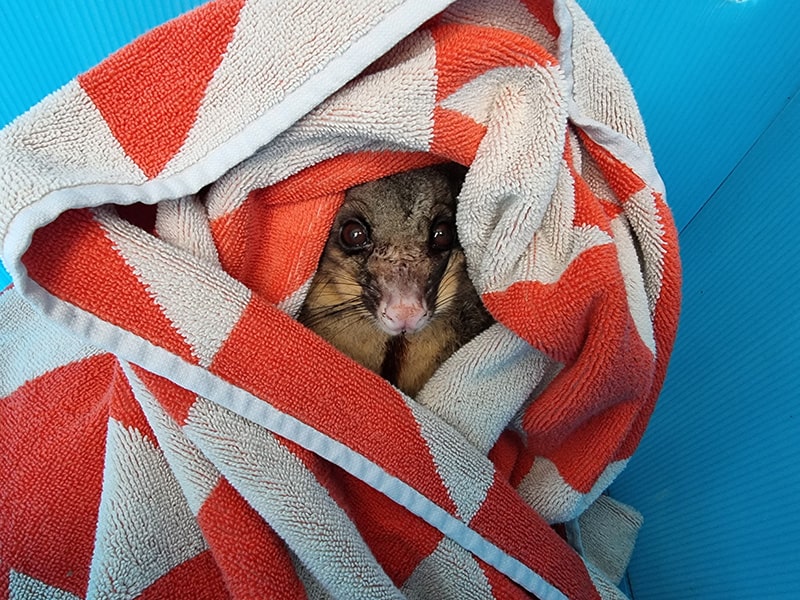Blog
Contact media@wires.org.au for enquiries or call 0416 272 153.
For the latest updates on bushfire recovery projects and emergency response
Read WIRES Emergency Recovery Plan and WIRES National Emergency Response Plan
Australian Floods - Wildlife Assistance Advice
Extreme weather events can result in stress and shock for wildlife.
As storms and heavy rain continue to lash Australia, we are receiving calls to assist animals impacted by the large areas of inundation and fast-flowing floodwaters. We ask that you please always follow the advice and directions from the relevant State authorities. For your own safety do not enter floodwaters at any time and if you are caught in a flood, call triple zero 000 for help.
At these times our rescue line can be extremely busy, but there are some simple things you can do to help.
Please keep an eye out for waterlogged animals. A waterlogged animal is completely saturated and often unable to move. They may be seeking shelter in unusual places.
Birds are often the most impacted by becoming waterlogged, unable to fly and seabirds and can be blown or swept off course and be found exhausted on beaches or even many kilometres inland.
If you find a bird in this state, you can pick them up by gently wrapping them in a small towel or soft cloth with no loose threads, where it is safe to do so. Then, take them inside and place in a ventilated box large enough for the bird to stand, place a soft cloth on the bottom of the box and let the bird warm up and dry out in peace and quiet.
Please do not feed the bird. If you feel it needs food, please call WIRES for advice first on 1300 094 737 or fill out our ‘Report a Rescue’ form.
Once the weather has settled and the bird has dried out, it can be taken back outside for release. To do this, open the box slowly and move back. The bird should fly away. If this does not happen, please call WIRES for further advice.

We have also received reports of a large number of young sea turtles being washed ashore because of the extreme weather conditions.
After wild weather, you may also see freshwater turtles or other reptiles in unusual places. If a turtle’s shell is cracked or there is sign of injury, it’s advisable you take it to the nearest veterinarian. Otherwise, you can re-locate it near a safe freshwater source. Please be cautious with turtles and ensure you are releasing into the correct type of water. If you are unsure if you have found a marine or freshwater turtle, please get in touch with WIRES to confirm.
Many ground-dwelling species are at risk and seeking refuge, some may be displaced from their homes. If you know of any local wildlife, especially burrow-dwelling species, please keep alert. Be vigilant on the road and keep an eye out for wildlife.
Small possums and gliders may also be found under trees after severe storms – we suggest that you check the hollows of any fallen trees if it is safe to do so.
Bats and Flying-Foxes have been seeking refuge under verandas, house eaves and in open sheds. Please do not handle or attempt to rescue, please call WIRES 1300 094 737 and a vaccinated volunteer will rescue the bat.

Finally, please be vigilant on the road and keep an eye out for wildlife.
The team at WIRES asks you to please stay safe and we thank you for your support and concern for our native wildlife.
If you see a native animal in distress, please call WIRES on 1300 094 737.
#WIRESWildlifeRescue
#NSWFloods
#AustraliaFloods
If you are interested in helping wildlife on the ground, please consider volunteering with WIRES. We have recently launched a new volunteer program called “Rescue 101” which provides the knowledge and skills needed to quickly start helping with native animal rescues. Read more here.
Search
Newsletter
Stay in touch and get our regular rescue stories, WIRES updates and a free copy of our 15 Ways to Help Wildlife ebook
Recent Posts
- Emergency Response Training for Wildlife Volunteers
- WIRES Introduces New Wildlife Rehabilitation Governance Courses in Collaboration with NPWS
- Community Support for Post-Bushfire Recovery of Wildlife in the Greater Blue Mountains
- Research Grants Program-2023 Recipients Announced
- National Koala Conference
- Nature Conservation Council's Bushfire Conference
- Support Stronger Nature Laws
- Helping Endangered Cockatoos: WIRES Grant Success Story
- Landmark Conservation Project Ensures The Future of The Northern Bettong
- Wildlife Road Collisions Unveiled
